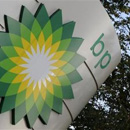Feds let BP avoid filing blowout plan for Gulf rig
Associated Press
Wed May 5, 2010
NEW ORLEANS - Petrochemical giant BP didn't file a plan to specifically handle a major oil spill from an uncontrolled blowout at its Deepwater Horizon project because the federal agency that regulates offshore rigs changed its rules two years ago to exempt certain projects in the central Gulf region, according to an Associated Press review of official records.
The Minerals Management Service, an arm of the Interior Department known for its cozy relationship with major oil companies, says it issued the rule relief because some of the industrywide mandates weren't practical for all of the exploratory and production projects operating in the Gulf region.
The blowout rule, the fact that it was lifted in April 2008 for rigs that didn't fit at least one of five conditions, and confusion about whether the BP Deepwater Horizon project was covered by the regulation, caught the attention of Interior Secretary Ken Salazar.
Following a tour of a boom operation in Gulf Shores, Ala., Salazar said Wednesday that he understood BP was required to file plans for coping with a blowout at the well that failed.
"My understanding is that everything was in its proper place," said Salazar.
But an AP review of government and BP documents found that the company had not filed a specific comprehensive blowout plan for the rig that exploded April 20, leaving 11 workers dead and spewing an estimated 210,000 gallons of oil a day.
Instead, a site-specific exploration plan filed by BP in February 2009 stated that it was "not required" to file "a scenario for a potential blowout" of the Deepwater well.
When questioned about the exemption claim, BP spokesman William Salvin said provisions for handling a blowout incident were actually included in the firm's 582-page region oil spill plan, though he had difficulty pointing to specific passages.
He later maintained that the Deepwater location was not subject to the blowout scenario requirements because it triggered none of the conditions cited in the MMS's April 2008 notice to operators about a loosening of the rules.
Still, Salvin insisted the company was prepared to handle a blowout and catastrophic spill at the project through provisions included in its regional plan.
"We have a plan that has sufficient detail in it to deal with a blowout," Salvin said, while acknowledging that the ongoing crisis at the Deepwater site is "uncontrolled."
The lack of a specific plan for the Deepwater project raises questions about whether BP could have been better prepared to deal with the ongoing disaster and whether MMS is fulfilling its regulatory oversight.
Robert Wiygul, an Ocean Springs, Miss., environmental lawyer, said the lack of a blowout scenario "is kind of an outrageous omission, because you're drilling in extremely deep waters, where by definition you're looking for very large reservoirs to justify the cost."
"If the MMS was allowing companies to drill in this ultra-deep situation without a blowout scenario, then it seems clear they weren't doing the job they were tasked with," he said. "The MMS can't change the law just by telling people that they don't have to comply with it. I think it really indicates that somebody at MMS was asleep at the switch on this."
Brendan Cummings, a Joshua Tree, Calif.-based lawyer for the Center for Biological Diversity, said the exploration plan submitted by BP for Deepwater Horizon failed to adequately analyze the project's oil spill risks. Cummings has filed a notice of intent to sue the government over another offshore drilling operation, by Royal Dutch Shell in Alaska.
"The technology used on the now-sunken Deepwater Horizon oil rig in the Gulf was supposed to be the most advanced in the world, including various mechanisms to prevent or cap a blowout," Cummings wrote in the filing. "None of these mechanisms worked, and the state-of-the-art technology completely failed to stop the spill."
In its 2009 exploration plan for the Deepwater Horizon site, BP strongly discounted the possibility of a catastrophic accident. Similarly, Shell's environmental impact analysis for its Beaufort Sea drilling plan asserts that the possibility of a "large liquid hydrocarbon spill ... is regarded as too remote and speculative to be considered a reasonably foreseeable impacting event."
The Deepwater Horizon disaster is not the first time MMS has been criticized as being too close to the oil industry.
In 2008, the Interior Department took disciplinary action against eight MMS employees who accepted lavish gifts, partied and - in some cases - had sex with employees from the energy companies they regulated. An investigation cited a "culture of substance abuse and promiscuity" involving employees in the agency's Denver office.
MMS workers were given upgraded ethics training.





 Share your thoughts in the Forum
Share your thoughts in the Forum
